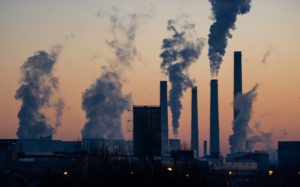Stephanie Thomas: Carbon Capture is a Fool’s Choice
Houston Chronicle op-ed
By Stephanie Thomas
 This op-ed was first published in the Houston Chronicle on July 1, 2021.
This op-ed was first published in the Houston Chronicle on July 1, 2021.
Carbon capture supporters who also want to continue extracting fossil fuels think they can have their cake and eat it, too.
The idea sounds appealing. Companies could continue to extract fossil fuels and the carbon generated from burning them could be stored underground. Some companies see the generation of hydrogen fuel from fossil sources combined with carbon capture as an alternative to gasoline for transportation and other energy needs. Investing billions in such plans, however, will only lock us onto the perilous path of climate disasters.
Companies such as Exxon Mobil tout carbon capture to appear climate-friendly, but it is not a “green” technology. Nor does it provide relief to those living along the fence lines next to refineries, breathing cancer-causing pollution.
Our window of opportunity is closing. The most recent modeling data from the World Meteorological Organization indicates a 40 percent chance that global temperature will surpass the 1.5 degree Celsius limit set forth in the Paris Agreement.
Failing to meet this target will amplify the risk of major environmental threats such as damage to key ecosystems, the collapse of ice sheets and the widespread die-off of animals like corals. Failing to meet this target could cause widespread crop failures that leave people across the globe starving. Humans are at grave risk if industries fail to reduce emissions and meet this target. Heat-related illness and death, vector-borne diseases and mental anguish from enduring one traumatic disaster after another cost us our health, our time and our money.
Beyond the threat of a warming climate, however, the burning of fossil fuels continues to pose other deadly costs, too. Air pollution, a byproduct of burning fossil fuels, harms people’s respiratory, cardiovascular, reproductive and neurological health. Living within 10 miles of a refinery increases risk of all cancers. A recent Harvard study calculates that air pollution from fossil fuel emissions is responsible for a staggering 20 percent of premature deaths globally.
Continuing to burn fossil fuels costs us. A recent National Resources Defense Council report shows that failing to address the emissions causing climate change and air pollution costs us over $820 billion each year. Unless action is taken, these costs will continue to climb each year. In the Houston area, particulate matter pollution, which is largely a byproduct of the combustion of fossil fuels, contributed to more than 5,000 premature deaths and almost $50 billion in economic damage in 2015 according to an analysis by the Environmental Defense Fund.
In places like the Permian Basin, where water is scarce, continued extraction will strain water availability and pit the needs of communities and farmers against industry. Even in the more humid areas of southeast Texas, industry’s need for water could butt against population growth, as millions more people will need access to clean, healthy water over the coming decades.
Storms like Harvey, Imelda and the numerous holiday floods exact a toll on our health, our well-being and our pocketbooks. And this isn’t a warning about the future. They are costing us now.
It’s much easier to prevent carbon from going into the atmosphere than for us to retrieve it after the fact.
We can all agree on one thing: A healthy environment and a strong economy are not an “either-or” choice. The way forward, however, is not to continue polluting by relying on risky, uncertain technology. We must stop emissions now and build a clean, green economy that works for all of us. And we must do it now.
Thomas, Ph.D., is an organizer with Public Citizen, a nonprofit organization that champions the public interest on energy, the environment and ethics in Texas.